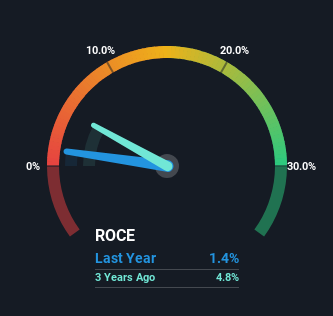- United States
- /
- Software
- /
- NYSE:MLNK
MeridianLink's (NYSE:MLNK) Returns On Capital Not Reflecting Well On The Business

Did you know there are some financial metrics that can provide clues of a potential multi-bagger? Amongst other things, we'll want to see two things; firstly, a growing return on capital employed (ROCE) and secondly, an expansion in the company's amount of capital employed. Put simply, these types of businesses are compounding machines, meaning they are continually reinvesting their earnings at ever-higher rates of return. In light of that, when we looked at MeridianLink (NYSE:MLNK) and its ROCE trend, we weren't exactly thrilled.
Understanding Return On Capital Employed (ROCE)
Just to clarify if you're unsure, ROCE is a metric for evaluating how much pre-tax income (in percentage terms) a company earns on the capital invested in its business. Analysts use this formula to calculate it for MeridianLink:
Return on Capital Employed = Earnings Before Interest and Tax (EBIT) ÷ (Total Assets - Current Liabilities)
0.014 = US$14m ÷ (US$1.1b - US$65m) (Based on the trailing twelve months to June 2023).
Therefore, MeridianLink has an ROCE of 1.4%. In absolute terms, that's a low return and it also under-performs the Software industry average of 9.4%.
Check out our latest analysis for MeridianLink

In the above chart we have measured MeridianLink's prior ROCE against its prior performance, but the future is arguably more important. If you're interested, you can view the analysts predictions in our free report on analyst forecasts for the company.
What Can We Tell From MeridianLink's ROCE Trend?
In terms of MeridianLink's historical ROCE movements, the trend isn't fantastic. Around three years ago the returns on capital were 4.8%, but since then they've fallen to 1.4%. However it looks like MeridianLink might be reinvesting for long term growth because while capital employed has increased, the company's sales haven't changed much in the last 12 months. It may take some time before the company starts to see any change in earnings from these investments.
The Bottom Line
To conclude, we've found that MeridianLink is reinvesting in the business, but returns have been falling. Unsurprisingly, the stock has only gained 0.5% over the last year, which potentially indicates that investors are accounting for this going forward. As a result, if you're hunting for a multi-bagger, we think you'd have more luck elsewhere.
MeridianLink could be trading at an attractive price in other respects, so you might find our free intrinsic value estimation on our platform quite valuable.
While MeridianLink may not currently earn the highest returns, we've compiled a list of companies that currently earn more than 25% return on equity. Check out this free list here.
New: Manage All Your Stock Portfolios in One Place
We've created the ultimate portfolio companion for stock investors, and it's free.
• Connect an unlimited number of Portfolios and see your total in one currency
• Be alerted to new Warning Signs or Risks via email or mobile
• Track the Fair Value of your stocks
Have feedback on this article? Concerned about the content? Get in touch with us directly. Alternatively, email editorial-team (at) simplywallst.com.
This article by Simply Wall St is general in nature. We provide commentary based on historical data and analyst forecasts only using an unbiased methodology and our articles are not intended to be financial advice. It does not constitute a recommendation to buy or sell any stock, and does not take account of your objectives, or your financial situation. We aim to bring you long-term focused analysis driven by fundamental data. Note that our analysis may not factor in the latest price-sensitive company announcements or qualitative material. Simply Wall St has no position in any stocks mentioned.
About NYSE:MLNK
MeridianLink
A software and services company, provides software solutions for banks, credit unions, mortgage lenders, specialty lending providers, and consumer reporting agencies in the United States.
Fair value with mediocre balance sheet.
Similar Companies
Market Insights
Community Narratives




